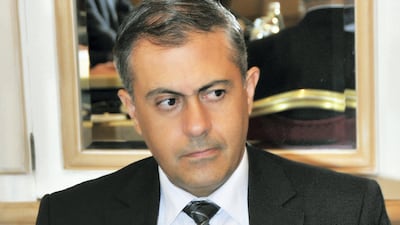A Lebanese judge has hit out at the nation’s endemic corruption, saying half of the public sector employees should be sacked, and admitting that people had tried to solicit bribes from him.
Marwan Abboud, who heads a body empowered to fire civil servants, blamed an archaic bureaucratic process and a fear of reporting misdeeds for the small number actually dismissed for wrongdoing.
“Half of the Lebanese state employees must be fired on charges of corruption,” he said in an interview with the local Al Manar TV station this week.
Nicolas Tueni, who was appointed Lebanon's first minister of state for combating corruption in 2016, quickly shot down Mr Abboud's suggestion, telling The National on Thursday that no one would be fired "unless it is proven that he is guilty".
“We are not a police state. We will not fire anybody just because we have some doubts. If these doubts are confirmed to be true we will fire them,” the caretaker minister said.
But Mr Abboud's remarks reflect a growing frustration among officials and campaigners fighting corruption in Lebanon, even as leading politicians claim to be making it a priority.

Despite recent efforts to tackle the issue, graft remains a part of daily life. Lebanon was ranked 143 out of 180 countries in Transparency International’s Corruption Perception Index last year, the country’s worst ranking since it was first included in the index 15 years ago.
President Michel Aoun has repeatedly spoken out about the need to tackle corruption, promising that reform would "be at the heart of the upcoming government's attention".
But despite such pronouncements, many see the problem getting worse. Cronyism is a chronic issue, with top positions in government and in the private sector often handed to family members. Lebanon’s public sector is notoriously overstaffed and ineffective, but it is incredibly difficult to fire people.
Mr Abboud heads the Supreme Disciplinary Board, which is responsible for ruling on allegations of impropriety and corruption against civil servants, and sacking them if necessary. However, his office can only act if another body, the Central Inspection Bureau, brings the cases to the board.
"Unfortunately, this rarely happens. Therefore, the committee has not been able to fulfil its duties," he said.
____________
Read more:
Saad Hariri confident of justice over father's assassination
Lebanon's Special Tribunal was supposed to represent an end to impunity for crimes
Lebanese politicians should avoid ruffling feathers in Washington by appeasing Hezbollah
____________
Mr Abboud, who despite his position has had people try to solicit bribes from him, said his department had fired only 25 employees this year, a number he considered extremely low.
“Forgive us for not meeting your expectations,” he said.
Those expectations were remarkably low to begin with — from top to bottom, corruption is seen by many Lebanese as so pervasive that it is unavoidable.
“We are raised on corruption,” said Christina Karam, a 58-year-old resident of Beirut. “Every paper you make with the government you have to pay for it. It’s been this way for 100 years. We can feel it and touch it in everything we do.”
Najib Mitri, author of the popular Blog Baladi, which regularly touches on corruption, said firing public sector employees would only mean they were replaced by more of the same.
“This new generation is worse than the previous ones,” he said. “It used to be that when there was money to build a bridge they would steal $200 million, but they would get the bridge done. Now they take the money and there is no bridge.”
Rabih El Chaer, a legal counsellor and anti-corruption activist, said bodies to fight corruption such as Mr Abboud’s simply did not have the resources to do their job.
“[Mr Abboud] is really frustrated because he can’t take any action. You have 1,000 municipalities in Lebanon, with all their civil servants. More than 100,000 of them across the country, can you imagine that the whole year they fire so few people?”
In 2015, Mr Al Chaer founded an NGO called “Sakker El Dekkene”, or “Shut the Store” in English, which created online tools for citizens to report corruption. But he said people stopped using them because they did not have faith that action would be taken.
“The majority of Lebanese are ready to be involved in corruption because they lost any hope,” he said. "Their tolerance for corruption is very high.”

